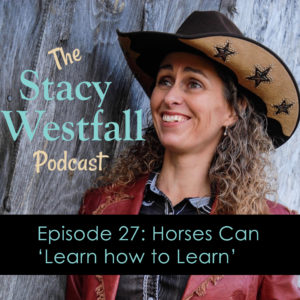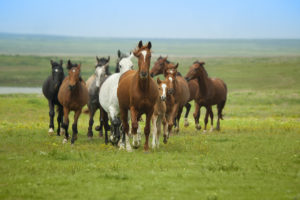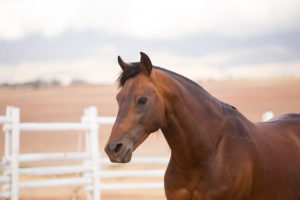Episode 27: Horses Can ‘Learn how to Learn’

Subscribe and never miss an episode! (I listen in the barn and when I’m out driving)
Subscribe For Free!
How horses learn is an interesting topic that we will be talking about today. Horses are interesting because they are excellent at detecting patterns. They look for patterns when they are speaking and communicating with other horses, and if you observe horses in the field, you will see a lot of questions being asked and answered.
When horses learn to communicate with humans, you will see a lot of the same patterns. There will be a lot of questions, answers, and repetition. Once we understand the patterns that our horses our recognizing, we can use these to teach our horses to learn faster.
“The more intentional you are with establishing patterns, the quicker the horses will catch on.” Stacy Westfall Click To TweetShow Notes
[02:57] Horses can learn how to learn. When a horse moves up to college level, and this means that they are really good at some advanced stuff.
[05:31] Presto is a great example of a horse that did not learn how to learn early.
[06:17] Justice had more language skills with other horses than Presto.

[07:24] Presto was lacking in natural reactions, but he still picks up on patterns.
[08:00] His interaction with Popcorn really helped him a lot.
[08:43] Now I’ve noticed that Presto is actually looking for patterns. He starts to ask questions earlier, because he is seeing the patterns.
[09:33] You may see a horse teach a human how to do something.

[10:57] Not all college-level horses have been trained through the method of learning how to learn. Some have been trained to be reactive. These horses don’t necessarily enjoy the learning process and will be more reactive or have negative anticipation.
[11:26] Avoidance anticipation is the opposite of learning how to learn.
[11:57] You want your horse to enjoy the learning process not be trained in a way that he wants to avoid learning.

[12:40] There’s a disconnect for horses to learn a lot of things in a short amount of time when they are worried about avoiding discomfort.
[13:35] I’m very intentional with paying attention to the patterns that I use when I work with my horses. I’m consciously making decisions to recognize and know what patterns are happening and what the side effects of these patterns are.
[14:01] Pay attention to any patterns you have with your horse. A simple one to pay attention to is feeding time.
“I make sure that I'm very sure about the patterns I use with Presto, and because of these patterns he's able to catch on quicker.” Stacy Westfall Click To TweetLinks and Resources:
Introducing Orphan Foals to New Horses
6 Comments
Leave a Comment
SUBSCRIBE TO THE PODCAST HERE:





YOURS FREE
WHY IS MY HORSE...?





Mounting block trick you taught me is still working great! This episode makes a lot of sense. I have learned to take more baby steps instead of trying to rush the training. It works much better that way!
Awesome! Yes, lots and lots of little steps. Next weeks episode mentions how many times I have people mount and dismount at clinics, lol. You know that from first-hand experience!
This episode was so enlightening. Your examples were very clear and helped me a lot.
That’s great! Next weeks episode goes a bit deeper into the idea, I hope you enjoy that one too!
I seem to love all your podcasts and this one is one of those! Texas (my gelding) was started early, quickly – and not finished – then lived the life of luxury in a field for 5 years doing nothing so he needed a restart. He could be difficult, terribly herd bound, would shut down, and even low rear to a sit when we started. I watched your videos and the Jac series no less than 4 times and did a year of ground work with him. I have found a trainer (because I’m not close enough to you lol) who really understands Texas and that he isn’t trying to be difficult, he is just trying to understand – and mostly that means taking it in smaller steps and he will do whatever you ask. I think Texas had to be taken from Avoidance Anticipation to trusting and breaking it down – giving him time to process in baby steps. Now, he really enjoys their lessons and is doing really well. I can’t believe I had two “trainers” locally who said they worried about re-starting him at 8 years!
Good job! I love the idea of re-starting. Horses are totally capable of learning at any age, especially when they see the pattern. It is so fun to give them the gift of understanding:)